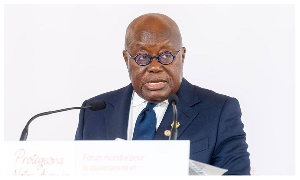Opacity and mismanagement in the oil and gas sector have turned financial problems into a much deeper economic crisis.
Fixing the worsening crisis in the oil, gas and electricity industries is a key issue in this month’s finance negotiations with investors and the International Monetary Fund. Not only are the power cuts and rocketing fuel prices damaging the economy, the mismanagement of the gas processing project in Atuabo, Western Region, is reckoned to have cost the country over US$2 billion, ramping up the budget deficit.
Last week, Finance Minister Seth Terkper launched a roadshow in Europe to raise finance for a $1 billion Eurobond but he has encountered deep concern about economic mismanagement. Accordingly, bankers reckon that Ghana may have to pay as much as 8.5% interest on the bond. This compares with neighbouring Cote d’Ivoire, which is paying just 5.38% on a bond that it floated in July. They blame the lack of tough policy reform in Ghana for the difference.
Later this month, former Finance Minister Kwesi Botchwey, who oversaw tough structural adjustment programmes in the 1980s, is to open negotiations with the IMF about a medium-term programme. The government is desperate to halt the slide in the cedi, which has lost 37% against the US dollar this year, and to cut back the budget deficit, forecast at 8.8% of gross domestic product.
Treasury officials talk of cutting the public wage bill to 35% of domestic revenue from its current 57% within three years. How that will be done with elections in 2016 remains a mystery. Public sector workers are a key constituency for all the main parties.
Politicians in both the governing National Democratic Congress (NDC) and the New Patriotic Party (NPP) are demanding answers from the Ministry of Energy and Petroleum about serial delays in building the gas plant and the award of oil blocks to politically connected companies.
The Chief Executive of Ghana National Gas Company, George Sipa-Adjah Yankey, faces criticism for his award of non-bid contracts. Most contentious was the decision in 2011 to award the $850 million contract for engineering, procurement and construction to China’s Sinopec for the Atuabo plant. Independent economists estimate that the contract was overpriced by at least 25%, while industry sources, including the China National Offshore Oil Corporation, say that Sinopec didn’t have the experience to ensure the project was delivered on time and using the best technology. Sinopec hired France’s Technip as technical consultant. After arguments between Accra and the China Development Bank over finance, the project is running at least a year late. Yankey has promised President John Mahama that it will be fully operational by December.
Again, without competitive tendering, Yankey and the GNGC have signed a 25-year joint-venture contract that makes Don Ackah’s Quantum Terminals the sole off-taker of the liquefied petroleum gas to be produced by the plant at Atuabo. The GNGC has also signed another joint venture with African Power Generation (Afgen) to build a plant in Benin to sell regasified LNG to Ghana. Meanwhile, the Energy Ministry has approved plans by Ackah and Matty Vengrik’s Quantum Power Ghana Gas Company to build a regasification facility in Tema.
Mohammed Amin Adam and Benjamin Boakye of the Africa Centre for Energy Policy (ACEP), an Accra-based non-government organization, question the rationale for siting the Afgen project outside Ghana. They also point to the financial risks associated with imported, regasified LNG, as compared to using Ghanaian gas. Over the next three years, gas from the Jubilee Field, the TEN (Tweneboa-Enyenra-Ntomme) project and the Sankofa-Gye-Nyame field development run by Italy’s ENI, would meet all of Ghana’s energy needs, according to industry experts and the World Bank. Adam and Boakye estimate that delays on Atuabo have cost the Treasury $2.2 billion, that’s four years’ supply of imported oil needed to fuel the thermal plants at Aboadze in the absence of a local gas supply.
Because of delays, the government lifted its ban on the flaring of gas from offshore oil wells, allowing Ireland’s Tullow Oil to flare 500 million cubic feet of gas until October. Having been forced to reinject gas, the Jubilee partners were losing 5,000 barrels per day (bpd) of oil production. Tullow says it has lost $100 million in earnings this year. Reinjecting the gas is holding back the Jubilee Field from reaching its full production level of 120,000 bpd.
Some of Yankey’s biggest critics are in the Ghana National Petroleum Corporation, which led the push for exploration in the 1980s and 1990s under its former Chairman, Tsatsu Tsikata. The GNPC is now chaired by Ato Ahwoi, a stalwart of the NDC, but its powers have been whittled away. The GNPC has now had its control over the gas production chain taken away by the GNGC. This is despite the setting up of the Bulk Oil Storage and Transportation Company to gather, process, transport and market Ghana’s gas. The GNGC has now been stripped down to a core role of becoming a world class oil producer. Yet senior figures in the government are questioning its use of oil revenue allocated to it from the Jubilee Field.
Since December 2013, Energy Minister Emmanuel Armah Kofi Buah, whose parliamentary constituency is in Atuabo, has rushed eight new petroleum agreements into law, six of which involve Nigerian companies. Former NPP minister Papa Owusu Ankomah called in Parliament for the Energy Minister’s powers to be curbed and for a competitive bidding system. He suggested the petroleum agreements had been pushed through parliament to avoid being subject to the tougher anti-corruption provisions promised in new legislation. Worse still, says Solomon Kwawukume of the Ghana Institute of Governance and Security, the government’s adoption of hybrid model concession agreements rather than production sharing contracts could cost the country $30 billion in oil and gas revenue over the next 20 years.
ACEP first raised concerns in March when Parliament was given just 48 hours to scrutinize petroleum agreements with CAMAC Energy and Amni International, both Nigerian firms, under a certificate of urgency. The beneficial owners of both firms have still not been disclosed, says ACEP, even to the Select Committee on Mines and Energy. It also questioned the financial capacity of the Ghanaian joint venture partner firms. ‘We strongly believe that the secrecy surrounding oil deals in Ghana is largely responsible… forgery and criminality. It is… a necessity for Ghana to adopt an open and competitive process for granting oil and gas concessions,’ ACEP said and warned that some Ghanaians were being used as fronts for unscrupulous foreign operators.
Source: Africa Confidential (12 September 2014)
Opinions of Saturday, 4 October 2014
Columnist: Africa Confidential



















